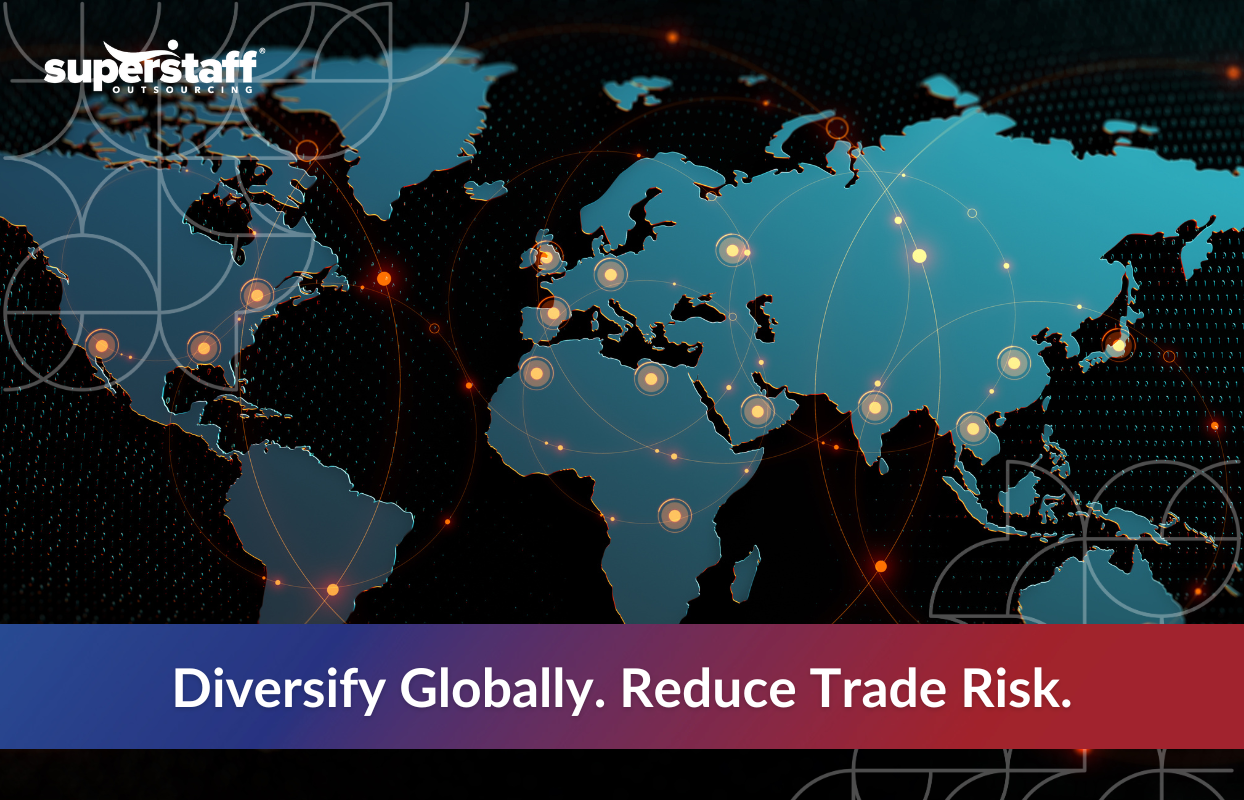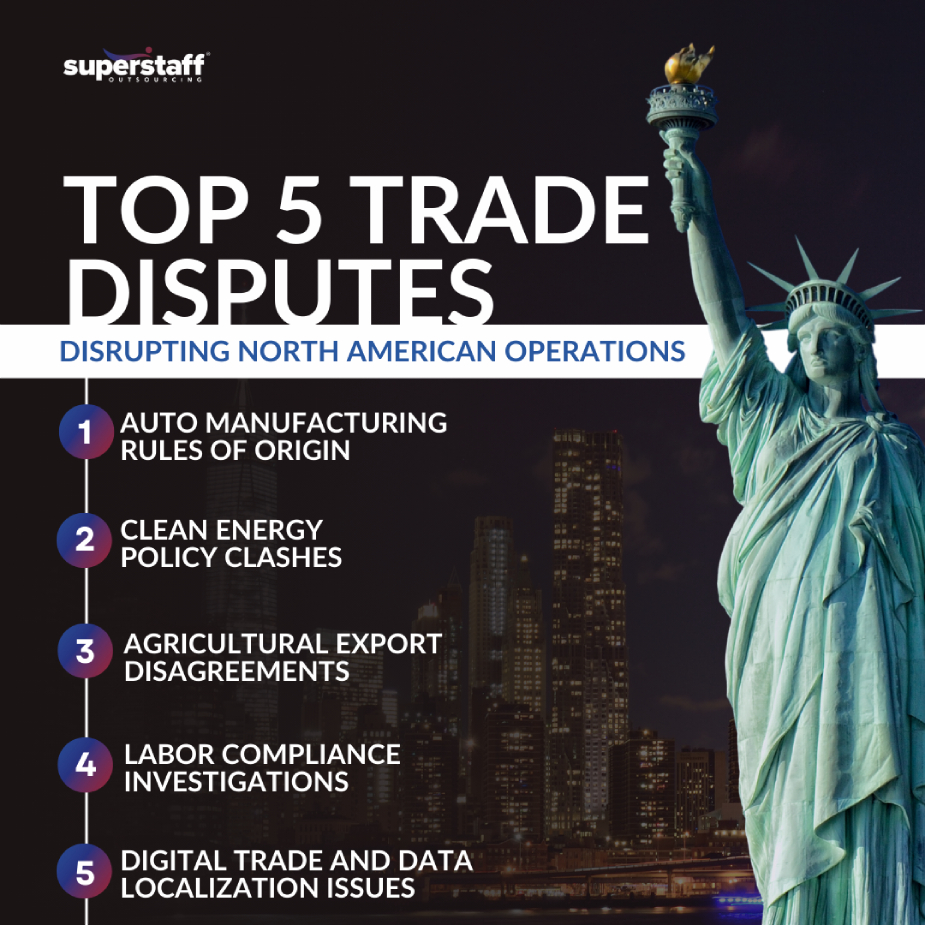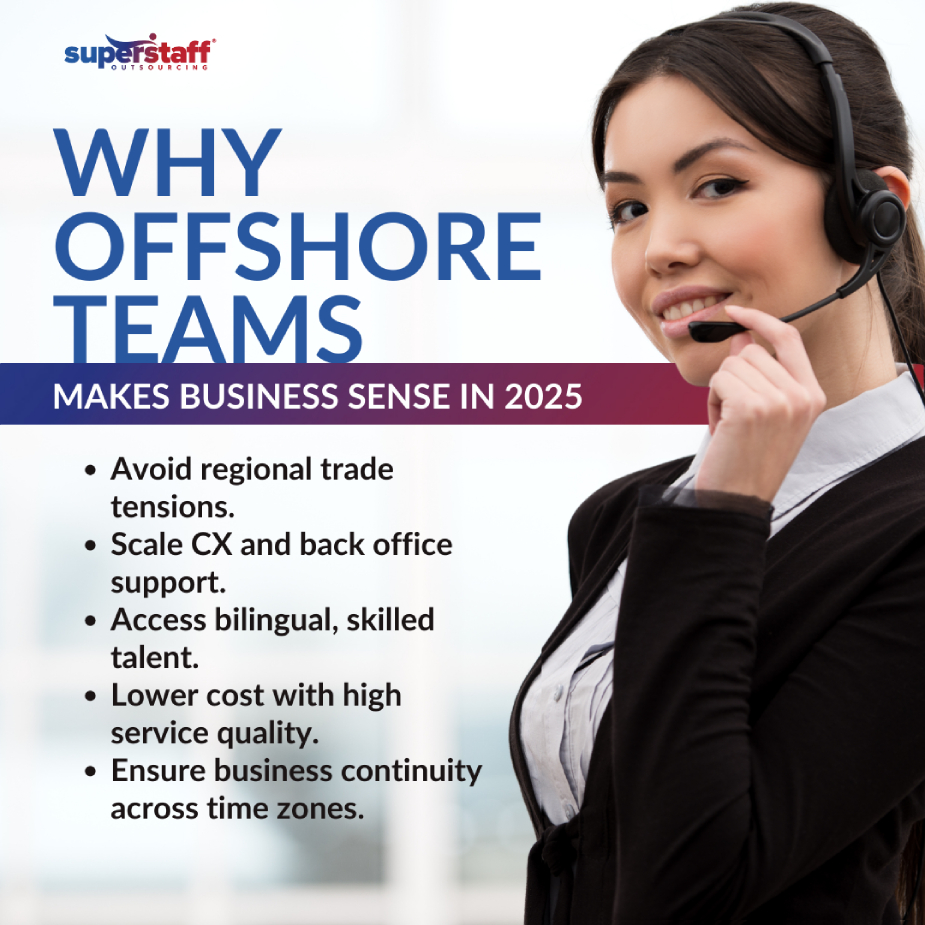
When regional trade tensions rise, the pressure to diversify your operations—and protect your bottom line—intensifies.
The U.S.-Mexico-Canada Agreement (USMCA), once seen as a pathway to seamless trade across North America, has become a new source of uncertainty in 2025. Ongoing disputes over labor standards, clean energy targets, digital trade policies, and environmental regulations are putting stress on the agreement—and on the companies that depend on its stability.
For many U.S. businesses, especially small and midmarket enterprises (SMEs), the fallout is real: rising costs, cross-border shipping delays, regulatory confusion, and compliance risks.
In this evolving environment, relying on a single trade bloc is no longer a safe bet. To stay resilient and competitive, companies are turning to offshore teams in countries like the Philippines and Colombia. This blog explores how global workforce diversification not only mitigates regional risk but also creates new pathways for offshore teams and business expansion—unlocking growth, flexibility, and long-term sustainability.
USMCA Trade Disputes Are Putting Pressure on Businesses
Tensions among the U.S., Mexico, and Canada are disrupting once-stable cross-border operations.

The USMCA entered into force in July 2020, bringing modern updates to its predecessor, NAFTA. But even five years later, friction is mounting. In 2025, the agreement faces new challenges, including:
- Labor disputes: The U.S. continues to push for stronger labor protections in Mexican factories, especially in the auto sector. Labor union crackdowns and verification challenges have sparked formal complaints and investigations.
- Environmental disagreements: The U.S. and Canada are pressing Mexico to honor commitments on clean energy reforms. Mexico’s government pushback has raised questions about fair competition and treaty compliance.
- Digital trade and data localization issues: Content moderation rules and data sovereignty proposals are creating further divergence in North American policy frameworks.
These aren’t isolated legal matters—they have ripple effects across industries:
- Auto manufacturers are facing new origin rule interpretations that complicate production and increase compliance overhead.
- Agricultural exporters are hit with sudden inspection delays and tighter sanitary standards.
- Clean energy companies face unpredictable investment environments due to inconsistent policy enforcement.
Key consequences of these disputes include:
- Operational uncertainty: Legal ambiguity discourages long-term investment planning.
- Cost volatility: Potential retaliatory tariffs and shifting rules impact pricing and profit margins.
- Regulatory confusion: Varying enforcement practices across borders make compliance a moving target.
In short, companies built to function within a seamless North American corridor are now exposed to mounting risks. SMEs and midmarket firms, with fewer buffers and resources, often feel the strain most acutely.
The Business Case for Geographic Diversification
Diversifying operations across multiple regions spreads risk and strengthens long-term resilience.
Overdependence on any one region—no matter how historically stable—is no longer a viable growth strategy. The growing unpredictability of the USMCA framework shows how quickly once-reliable systems can erode. Companies now realize that geographic diversification is not just about opportunity—it’s about survival.
Offshore outsourcing allows companies to reduce regional exposure while tapping into global pools of talent and infrastructure. This shift is especially critical when navigating uncertain trade relations.
Key advantages of geographic diversification:
- Risk mitigation: If one region experiences political or economic turmoil, others can absorb the shock.
- Flexibility and agility: Offshore teams allow you to quickly pivot operations without needing to shut down core business functions.
- Cost stability: Offshore locations are often less affected by inflation, tariffs, and compliance changes.
- Global talent access: Outsourcing opens doors to skilled labor markets—many of which are English-speaking, culturally aligned, and digitally savvy.
Example:
A mid-sized U.S. apparel brand recently experienced rising friction due to new textile origin labeling rules between the U.S. and Mexico. Rather than risk delayed shipments and customer complaints, they began routing customer service and order processing through an offshore team in the Philippines. This allowed them to remain responsive to customer concerns, even as physical shipments lagged.
The lesson? Offshore teams offer more than cost savings—they serve as operational insurance in times of trade instability.
Offshore Teams Offer Stability and Scalability

Offshore outsourcing provides immediate access to skilled teams while reducing regional risk exposure.
Two regions leading the charge for offshore talent in 2025 are the Philippines and Colombia—both known for their mature BPO ecosystems, strong government support, and tech infrastructure.
The Philippines: A Global CX Powerhouse
The Philippines has long been a top destination for customer experience outsourcing. With a workforce of over 1.3 million BPO professionals, the country delivers:
- Excellent English communication skills and cultural fluency with U.S. consumers.
- Robust training ecosystems focused on CX, IT, finance, and healthcare support.
- Strong data security frameworks, especially under its Data Privacy Act and ongoing digital transformation initiatives.
Colombia: Latin America’s Emerging Talent Hub
Colombia is rising fast as an offshore location, especially for U.S. firms seeking time zone alignment and Spanish-speaking capabilities. The country offers:
- A large pool of bilingual professionals trained in tech, CX, finance, and compliance.
- Stable internet infrastructure and a growing remote work ecosystem.
- Government incentives for IT and BPO operations in strategic cities like Medellín and Bogotá.
Together, these regions offer:
- Scalable teams that flex with demand cycles.
- Neutral trade positions, avoiding the fallout from U.S. regional trade spats.
- Lower labor costs, enabling more investment in innovation and business development.
Whether you need 5 agents or 500, an offshore partner can provide the infrastructure, oversight, and talent to scale with precision.
Industries Most Affected by USMCA Tensions Can Benefit From Outsourcing
Certain sectors are more vulnerable to regional trade disputes—and also stand to gain the most from offshore solutions.
1. Manufacturing
Trade disputes over auto parts, steel, and labor conditions have disrupted North American production timelines. Manufacturers can:
- Offshore procurement, inventory tracking, and compliance documentation to improve responsiveness.
- Use CX teams in the Philippines to handle warranty claims and customer communications when delays occur.
2. Logistics and Transportation
Border slowdowns, customs issues, and trucking shortages create chaos in fulfillment. Logistics firms can:
- Offshore track-and-trace, dispatch, carrier sales, and billing verification.
- Leverage teams in Colombia for Spanish-language carrier coordination across Latin America.
3. Retail and E-Commerce
Retailers tied to just-in-time inventory across North America are particularly exposed. These businesses can:
- Shift order processing, returns handling, and multilingual customer service to offshore teams.
- Utilize real-time reporting dashboards to manage offshore and onshore teams seamlessly.
4. Agriculture and Food Tech
Sanitary regulations and labeling disputes slow down shipments and affect demand forecasting. Agri-businesses can:
- Use data entry, compliance support, and customer education teams to ensure ongoing visibility and communication.
- Offshore billing and reconciliation functions to reduce internal burdens.
Each of these industries faces unique exposure—but outsourcing provides a flexible toolset to navigate turbulence.
Real-World Results of Offshore Diversification
Firms that embraced global workforce strategies are showing stronger resilience and higher customer satisfaction.
Case studies and industry benchmarks reinforce that companies with diversified operations fare better during disruptions. Let’s examine two examples.
Example 1: E-Commerce Success Amid Shipping Delays
A U.S.-based e-commerce firm had a warehouse in Mexico and distributed to both U.S. and Canadian markets. In early 2024, disputes around new labeling rules caused border delays of up to 5 days. Rather than risk lost sales due to customer complaints, the company:
- Shifted its CX operations to the Philippines, allowing 24/7 customer support.
- Introduced live chat and order tracking support, staffed by offshore agents.
- Maintained high Net Promoter Scores (NPS), despite fulfillment delays.
Example 2: Agri-Tech Startup Builds Billing Hub in Colombia
An agri-tech startup supplying cross-border sensors to North American farms saw new tariffs on U.S.-Mexico electronics imports. While lobbying efforts played out, they:
- Set up a billing, invoicing, and compliance team in Colombia.
- Continued scaling new client acquisitions without overburdening their U.S. team.
- Reduced finance overhead by 38%, freeing up funds for R&D.
These examples showcase the transformational impact of offshore staffing—not just as cost savers, but as growth enablers.
Why SuperStaff Is the Ideal Offshore Partner for U.S. Firms
SuperStaff provides full-service outsourcing solutions tailored to help U.S. businesses weather uncertainty and grow globally.
We know how to bridge the gap between instability and performance. With operations in both the Philippines and Colombia, we help you:
- Build resilient teams in locations untouched by North American trade policy conflicts.
- Customize solutions across CX, back office, and technical support functions.
- Scale without risk, ensuring business continuity even during peak disruption.
SuperStaff’s Advantages:
- Flexible team sizes, from small agile pods to large enterprise units.
- ISO-certified processes and data security frameworks.
- Multilingual capabilities, enabling U.S. businesses to expand globally.
- Industry-specific expertise, whether you’re in healthcare, e-commerce, logistics, or fintech.
When tensions rise and predictability fades, SuperStaff brings the calm, clarity, and capability you need.
Offshore Teams and Business Expansion: The Smarter Way to Stay Resilient Amid Trade Uncertainty
In a world where regional trade pacts are no longer bulletproof, offshore diversification is no longer optional. The USMCA was supposed to simplify North American trade—but in practice, it’s adding new layers of complexity. For U.S. SMEs and midmarket firms, relying solely on one regional alliance creates unnecessary risk.
Offshore teams offer a strategic solution—reducing exposure to regional disputes, improving service uptime, and unlocking global scale. SuperStaff helps you transform that strategy into execution. Whether you’re exploring back-office support, customer engagement, or compliance solutions, our teams in the Philippines and Colombia are ready to deliver.
Relying on one region is a risk you can’t afford. Start building your global team with SuperStaff to stay resilient—whatever the trade winds bring.





